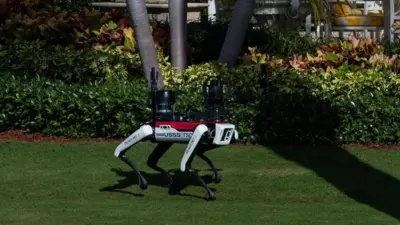We've updated our Privacy and Cookies Policy
We've made some important changes to our Privacy and Cookies Policy and we want you to know what this means for you and your data.
Uber says 'no sacred cows' amid coronavirus crisis
Image source, Getty Images
Uber has warned it may scale back parts of the business as it tries to navigate through the coronavirus crisis.
"There are no sacred cows," said the taxi-hailing app's chief financial officer Nelson Chai.
It follows Uber's announcement on Wednesday that it would cut about 14% of its staff.
That move, and others the firm has made, will save more than $1bn (ВЈ810m) this year, but more measures may be necessary Mr Chai said on Thursday.
Uber, known for its ride-hailing app, has also ventured into other areas, such as driverless cars and freight. But since chief executive Dara Khosrowshahi, who took over after the ouster of founder Travis Kalanick, the firm has concentrated more on its rides and food delivery business.
As the pandemic takes a financial toll, executives warned that they are looking for places to cut.
"We're taking a hard look at our overall cost structure...to ensure our core business of rides and eats emerges stronger than ever," Mr Khosrowshahi told investors in a call to discuss the firm's quarterly results.
Uber said revenue in the three months to 31 March 2020 reached $3.5bn, up 14% year-on-year, in part due to increased food delivery.
But the firm's losses surged to $2.9bn, compared to $1bn a year ago.
Some of the decline was due to write-downs of the worth of minority investments. The firm was also hit by a drop in demand, as countries began to institute stay-at-home orders.
Uber's rides business - which contributes the bulk of its revenue - was down 80% in April, after the orders were instituted, Mr Khosrowshahi said.
But he added that he was encouraged by signs of recovery.
In Hong Kong, for example, Mr Khosrowshahi said demand has returned to about 70% of its pre-crisis levels. In Texas and Georgia, where officials have relaxed restrictions, he said ridership has also been increasing slightly in recent weeks.
Mr Khosrowshahi said that the crisis would delay the firm's goal of becoming profitable by a matter of "quarters, not years".
"We're going to continue to look for more efficiencies. The reality is the world has changed and we don't know when the recovery is going to be," said Mr Chai.
"We're going to take the actions that we think are necessary."
Top Stories
More to explore
Most read
Content is not available








